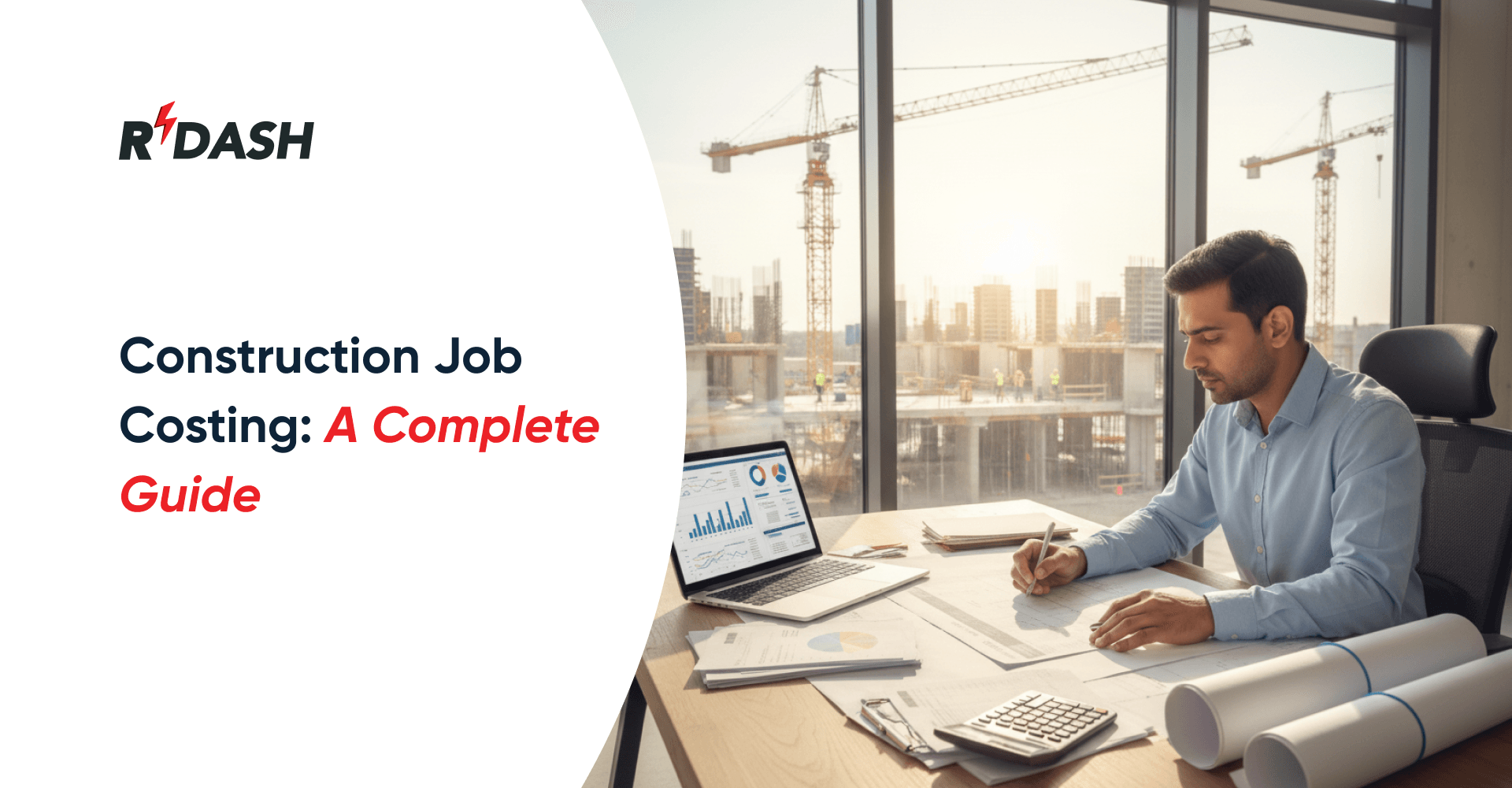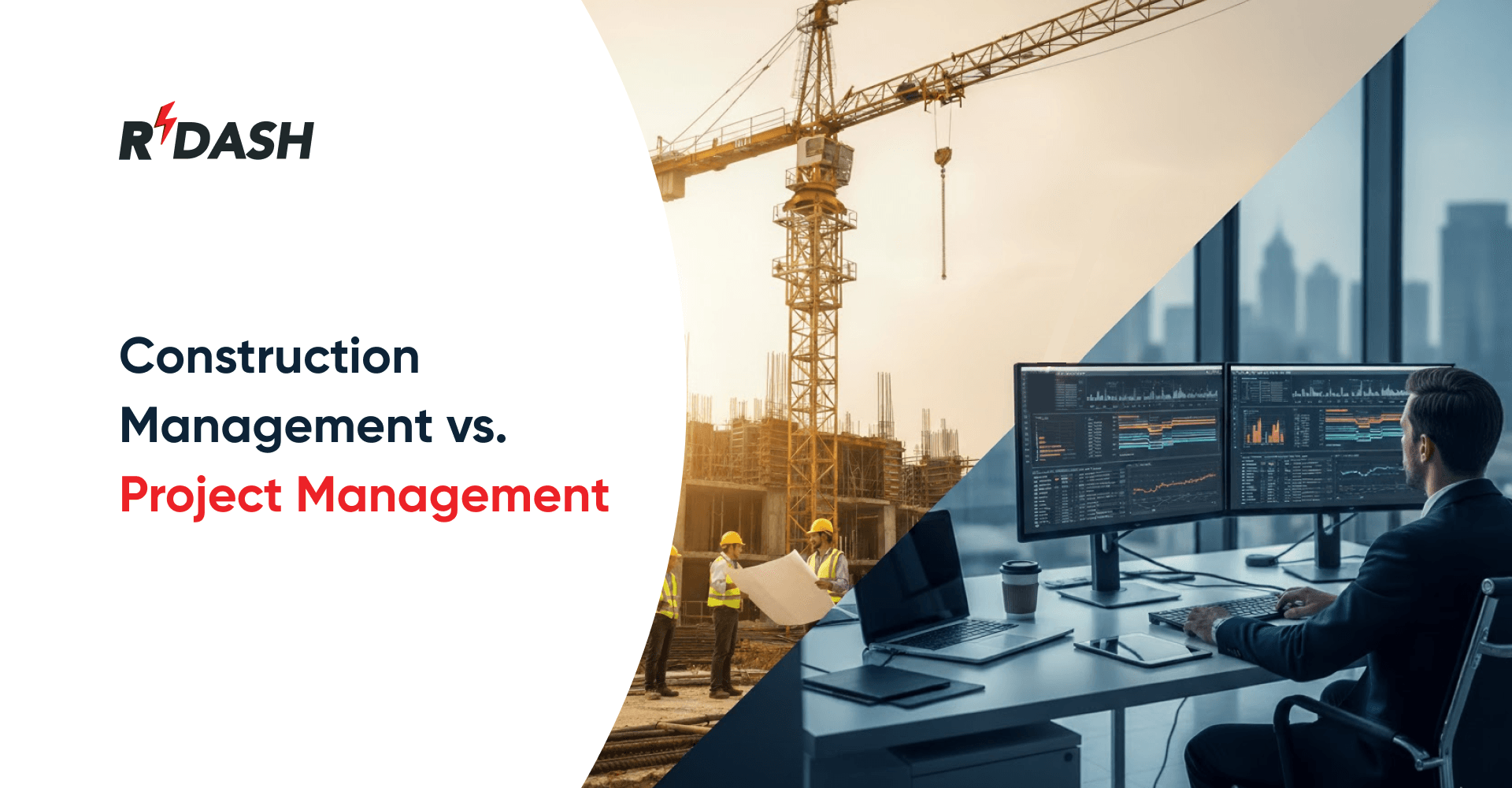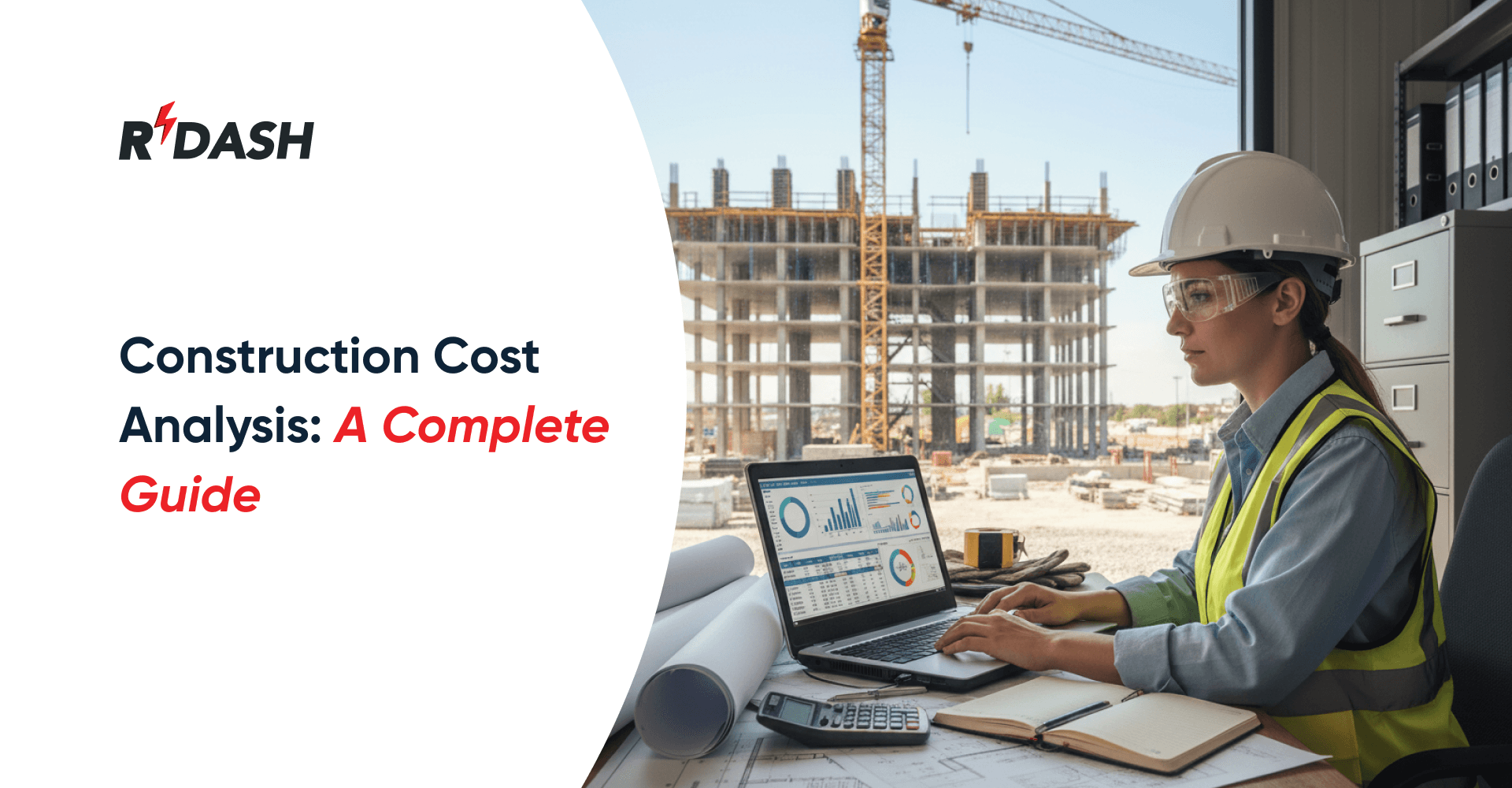Retail construction in India is a multifaceted endeavor, characterized by unique challenges that require innovative solutions. The following sections delve into the key aspects of retail construction, outlining the most common roadblocks, best practices to overcome them, real-world examples, and the strategic approach adopted by RDash. This blog is tailored to professionals seeking to navigate the complexities of retail construction in India.

Navigating the landscape of construction projects for retail spaces in India involves unique challenges that require innovative solutions. The following sections delve into the key aspects of these projects, outlining the most common obstacles, best practices to overcome them, real-world examples, and the strategic approach adopted by Rdash. This blog is tailored to professionals seeking to navigate the complexities of building retail environments in India.
Retail Construction : Services and Key Challenges
Construction services for retail spaces in India come with multiple layers of complexity. Here are the primary challenges:
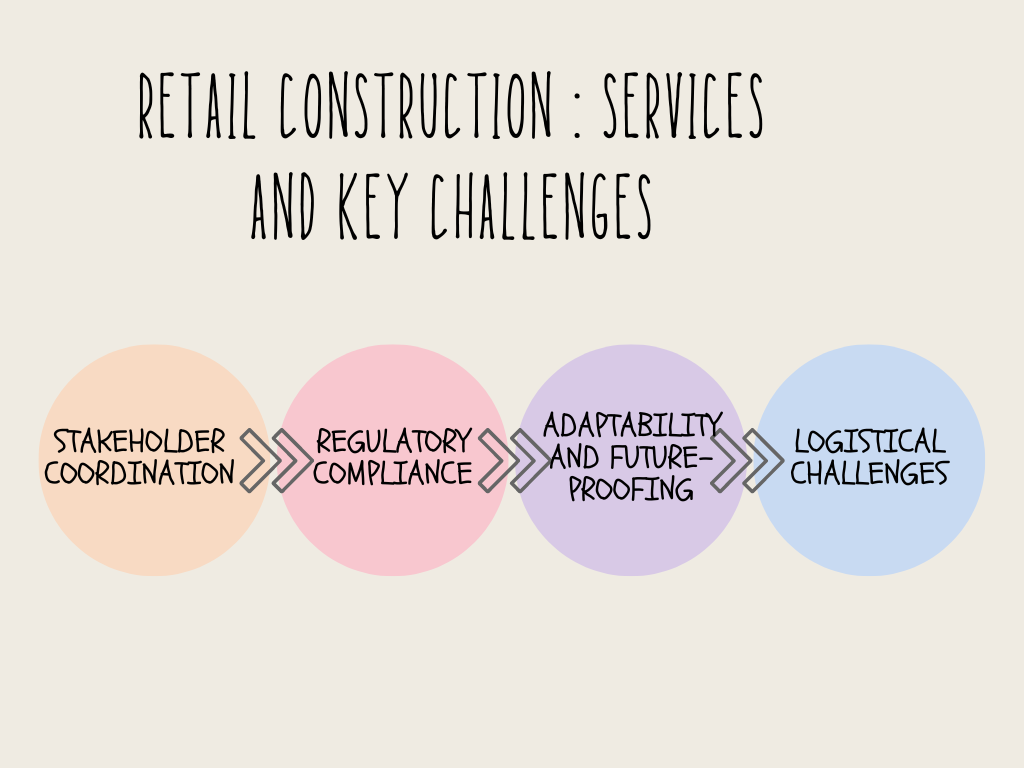
- Stakeholder Coordination : Coordinating among diverse stakeholders like architects, contractors, suppliers, and retailers is critical, and clear communication across all parties is essential to prevent misunderstandings and delays.
- Regulatory Compliance : Navigating diverse regulatory requirements across different states and municipalities, while managing the process of obtaining necessary permits and adhering to local building codes, is vital for smooth project execution.
- Adaptability and Future-Proofing : Designing retail spaces that can swiftly adapt to changing consumer preferences and incorporating flexible store layouts that allow for easy reconfiguration and expansion are crucial in modern retail environments.
- Logistical Challenges : Managing the timely delivery of construction materials, particularly in regions with infrastructure constraints, and aligning construction schedules with the availability of both materials and labor are critical to the success of retail construction projects.
Common Roadblocks in Retail Construction Projects
Projects involving retail spaces in India often encounter several recurring roadblocks. These include:
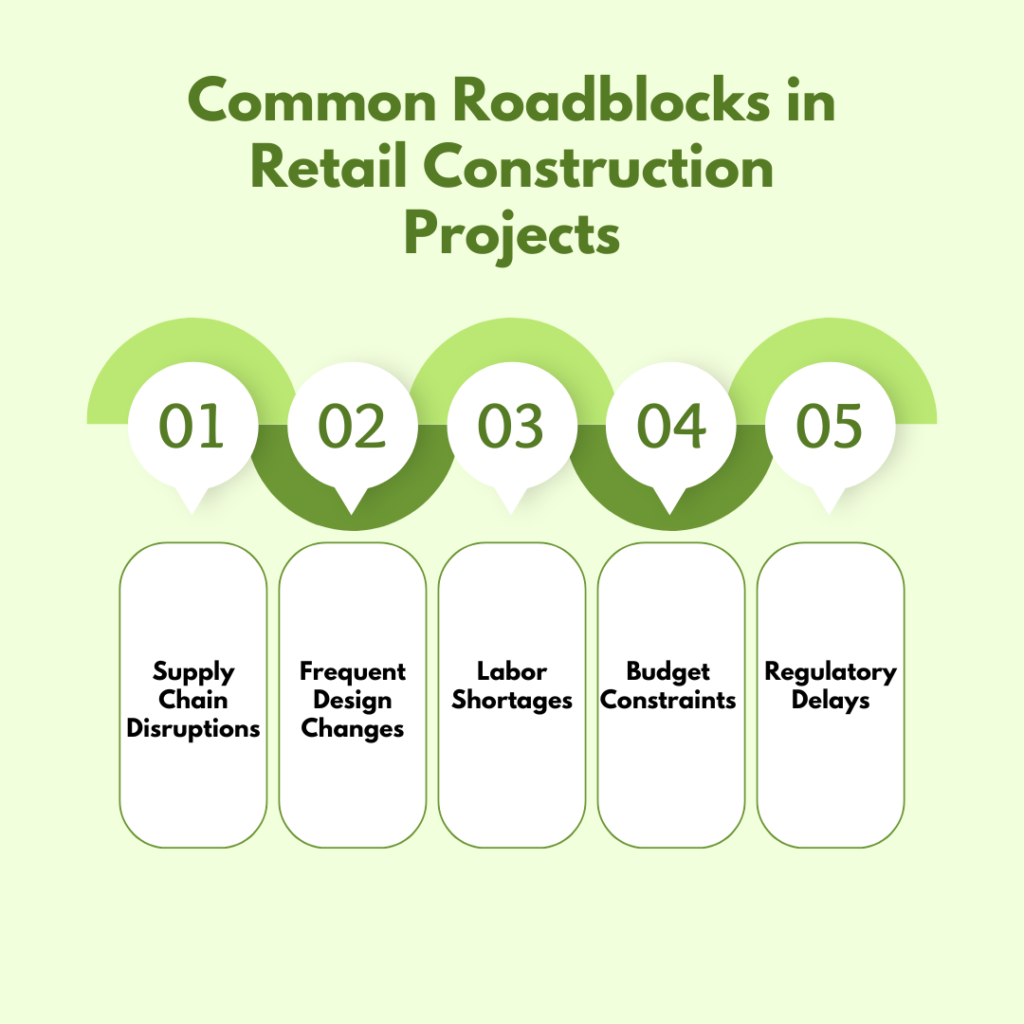
- Supply Chain Disruptions : Interruptions in the supply of materials and challenges in transportation and distribution, especially in remote areas, can lead to significant project delays.
- Frequent Design Changes : Adjustments requested by retailers due to changing market demands can lead to design changes, which often cause delays in the construction schedule and impact the overall project timeline.
- Labor Shortages : Difficulty in securing skilled labor can impact the quality and timelines of retail construction projects, making it essential to invest in workforce training to meet specific demands.
- Budget Constraints : Unforeseen expenses can lead to budget overruns, highlighting the importance of meticulous budgeting and financial management for the success of retail construction projects.
- Regulatory Delays : Time lost in obtaining necessary permits and navigating complex local regulations can significantly delay retail construction projects.
Retail Construction Overcoming Challenges : Best Practices
Overcoming these challenges requires a strategic and proactive approach. Here are some best practices:

- Effective Communication : Implementing a system for regular updates and progress reports, along with utilizing collaborative tools, is essential for effective communication among stakeholders and overall project success.
- Proactive Planning : Developing contingency plans to address potential disruptions, alongside creating precise schedules that account for potential delays and challenges, is crucial for successful project management.
- Technology Integration : Adopting Building Information Modeling (BIM) to visualize and plan the entire project, combined with leveraging project management software to monitor progress in real-time and make necessary adjustments, is essential for effective project execution.
- Workforce Training and Development : Investing in training programs to enhance workforce skills is critical for maintaining high-quality standards and ensuring project success.
- Regulatory Engagement : Engaging with local authorities early in the project and developing strategies to ensure compliance with regulations are essential for smooth regulatory processes and project success.
Real-World Examples : Lessons Learned
Learning from real-world examples can provide valuable insights into the construction of retail spaces. Here are some notable cases:
- Mall Development in Mumbai : The project addressed supply chain disruptions by utilizing local suppliers and just-in-time delivery practices, successfully mitigating delays and completing on schedule.
- Retail Store Chain in Bangalore : Integrating BIM early in the process allowed the retail chain to minimize design changes and stay within budget, resulting in timely project completion with minimal cost overruns.
- Hypermarket in Delhi : Implementing a workforce training program upskilled local workers, ensuring continuous progress and maintaining project quality, which helped meet deadlines despite initial labor shortages.
RDash Approach: Streamlining Retail Construction
Rdash, a leader in construction management, employs a comprehensive approach to streamline the construction of retail spaces. Here’s how they tackle common challenges:
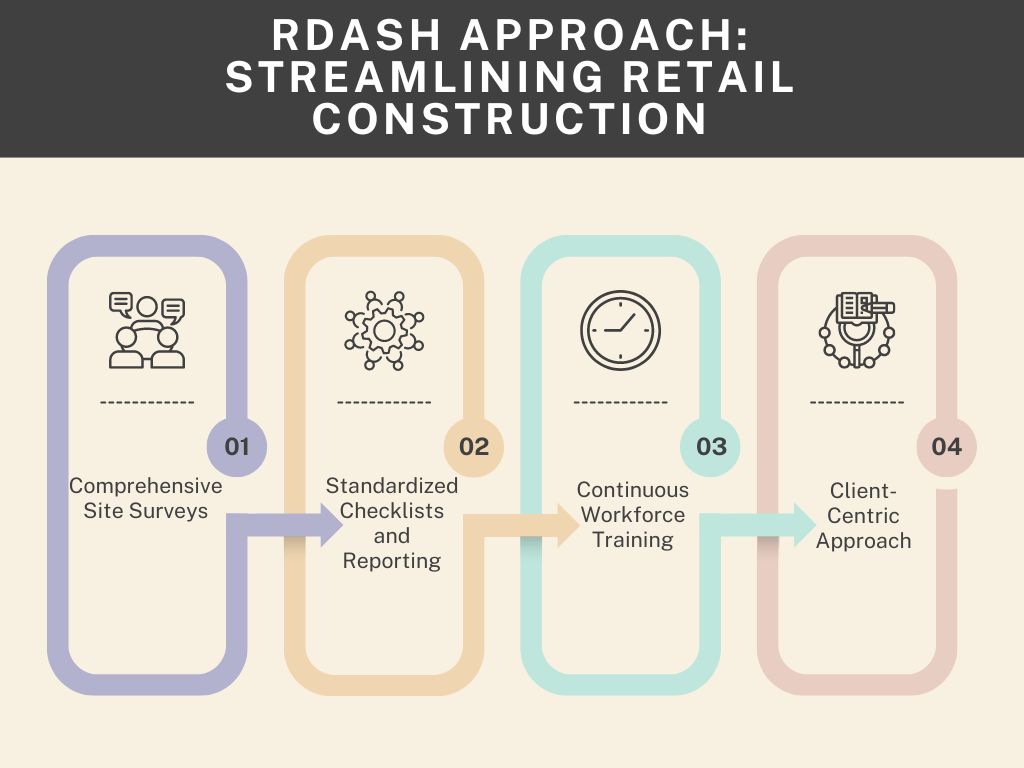
- Comprehensive Site Surveys : RDash performs comprehensive site surveys to document existing conditions, material movement guidelines, and structural layouts, ensuring that all aspects are thoroughly reviewed to prevent delays during the construction phase.
- Standardized Checklists and Reporting : RDash employs standardized checklists and reporting formats to systematically gather and organize information, ensuring clear and effective communication with clients through well-structured reports.
- Continuous Workforce Training : RDash utilizes BIM and project management software to streamline processes, allowing for real-time monitoring and adjustments that minimize delays and cost overruns.
- Client-Centric Approach : RDash involves clients early in the planning process to ensure their needs and preferences are integrated into the project, which helps reduce the likelihood of costly design changes.
Future Trends : Staying Ahead of Roadblocks
Looking ahead, several trends are expected to shape the future of constructing retail spaces in India:
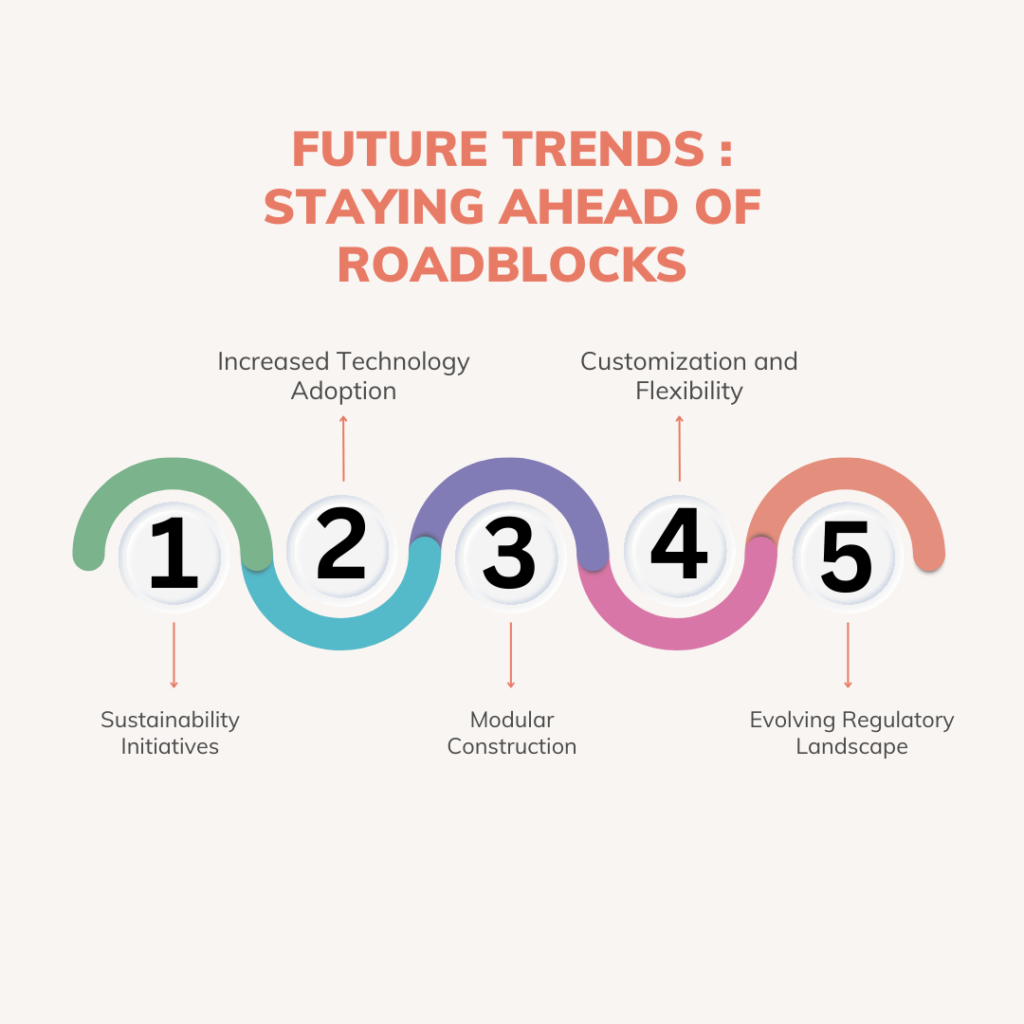
- Sustainability Initiatives : The growing demand for sustainable construction practices, including the use of eco-friendly materials and energy-efficient designs, combined with adapting to stricter environmental regulations and consumer expectations, will be crucial for future retail construction projects.
- Increased Technology Adoption : The wider adoption of technologies such as BIM, 3D printing, and augmented reality, along with the digitalization of construction management processes, is expected to enhance efficiency, precision, and overall project outcomes.
- Modular Construction : The rise of modular construction techniques, which involve building components off-site and assembling them on-site, is set to revolutionize the industry by offering significant reductions in both construction time and costs, making it a highly attractive option.
- Customization and Flexibility : The need for retail spaces that can be easily customized and reconfigured to meet changing consumer demands will drive innovation, with a focus on designing flexible solutions that allow for future modifications without major disruptions.
- Evolving Regulatory Landscape : The evolving regulatory framework in India will necessitate companies to stay informed and adapt quickly, with proactive strategies essential for ensuring compliance with new laws and regulations.
Conclusion
The challenges of retail Construction spaces in India are significant but not insurmountable. By adopting best practices such as effective communication, proactive planning, and technology integration, companies can navigate these challenges successfully. Learning from real-world examples and staying ahead of industry trends will also be crucial for the success of projects. RDash comprehensive approach, combining thorough site surveys, continuous workforce training, and advanced technology adoption, serves as a model for overcoming the common roadblocks in the industry.


